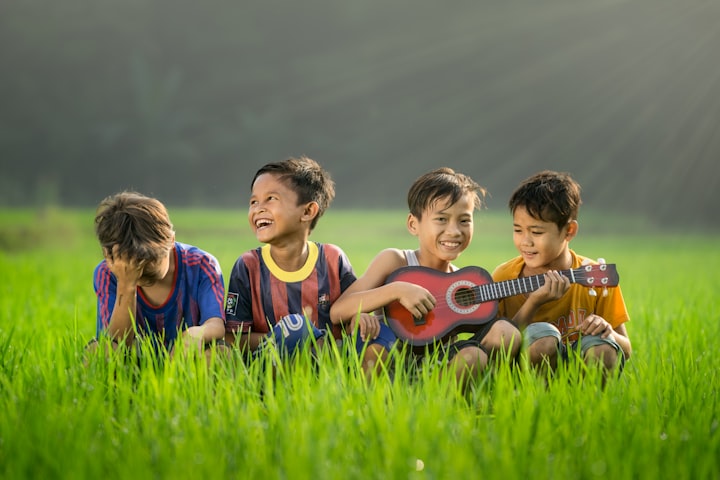Teaching Mindfulness to Kids
Cultivating Calm and Focus

In today's fast-paced and increasingly stressful world, teaching mindfulness to children has become more important than ever. Mindfulness is a powerful practice that helps children develop self-awareness, emotional regulation, and a sense of calm and focus. In this article, we will explore the benefits of teaching mindfulness to kids, discuss practical techniques for incorporating mindfulness into their daily lives, and provide real-life examples of how mindfulness has positively impacted children. By introducing mindfulness at an early age, we can empower children to navigate life's challenges with resilience and cultivate a lifelong practice of well-being and inner peace.
Mindfulness is a transformative practice that enhances children's emotional well-being. By cultivating self-awareness, children learn to recognize and regulate their emotions effectively. Mindfulness helps them manage stress and anxiety, fostering a positive mindset and promoting overall emotional resilience. Real-life examples of children who have experienced improved emotional well-being through mindfulness practices can inspire and motivate parents to introduce mindfulness to their own children.
In an age of constant distractions, mindfulness exercises offer a valuable tool for improving children's focus and concentration. By teaching children to bring their attention to the present moment, mindfulness enhances their ability to concentrate, leading to improved academic performance and better learning outcomes. Sharing stories of children who have experienced increased focus and attention through mindfulness practices can highlight the potential impact on children's educational journeys.
One of the most significant benefits of mindfulness for kids is the development of self-regulation skills. Through mindfulness, children learn to recognize their emotions without judgment and respond to challenging situations with greater resilience and composure. By developing self-regulation skills, children can make better choices, manage conflicts effectively, and navigate interpersonal relationships with empathy and understanding. Real-life examples of children who have developed self-regulation skills through mindfulness can illustrate the power of this practice.
Mindfulness practices promote empathy and compassion by helping children develop a deeper understanding of their own emotions and the emotions of others. By teaching children to be fully present and attentive to their own experiences, mindfulness nurtures a sense of empathy and kindness towards others. Sharing stories of children who have shown increased empathy and acts of kindness through mindfulness practices can inspire parents to foster these qualities in their own children.
Practical techniques such as mindful breathing and body awareness can be easily introduced to children. Belly breathing and body scan exercises help children connect with their breath and their physical sensations, promoting relaxation and grounding. Providing step-by-step instructions and real-life examples of children engaging in these practices can guide parents in incorporating mindfulness into their children's daily routines.
Incorporating mindful movement and yoga into children's daily lives offers numerous benefits. These practices not only enhance physical well-being but also cultivate mental focus and mindfulness. Simple yoga poses and mindful movement activities suitable for children can be shared, along with real-life stories of children experiencing the positive effects of these practices.
Teaching children mindful eating and savoring encourages them to pay attention to their senses while eating, fostering a deeper appreciation for food. By engaging children in practices that promote mindfulness during meals, parents can help them develop healthy relationships with food and cultivate gratitude. Practical tips and real-life examples of children practicing mindful eating can inspire parents to incorporate this mindful practice into their children's lives.
Mindful listening and communication skills are crucial for building strong relationships and resolving conflicts effectively. Parents can teach children active listening, empathy, and effective communication skills through mindfulness practices. Providing strategies and techniques for mindful communication, along with real-life examples of children applying these skills, can guide parents in fostering better communication within their families.
Designing mindful spaces at home and incorporating daily rituals that promote mindfulness can create a supportive environment for children. Gratitude practices, reflection time, or designated peaceful areas can help children develop a habit of mindfulness. Sharing ideas for creating mindful spaces and real-life examples of children benefiting from these practices can inspire parents to cultivate mindfulness within their homes.
Parents play a crucial role in nurturing mindfulness in their children. By practicing mindfulness themselves, parents can lead by example and demonstrate the benefits of this practice. Sharing personal stories of parents who have embraced mindfulness and the positive impact it has had on their parenting can inspire others to incorporate mindfulness into their own lives.
Engaging in mindful activities together as a family can strengthen bonds and create shared experiences. Mindful walks, mindful art, or mindful storytelling are examples of activities that parents can enjoy with their children. Real-life examples of families incorporating mindfulness into their daily lives can encourage parents to create meaningful connections through these shared moments.
Mindful communication deepens the parent-child bond and fosters a positive and supportive environment. Parents can cultivate mindful communication by actively listening, showing empathy, and practicing non-judgment. Sharing tips for practicing mindful communication and real-life examples of families improving their relationships through mindful interactions can empower parents to nurture a mindful and loving atmosphere at home.
Teaching mindfulness to children is a gift that empowers them with lifelong skills for emotional well-being, focus, self-regulation, empathy, and compassion. By incorporating mindfulness into their daily lives and nurturing a mindful parenting approach, we can help children navigate life's challenges with greater ease and inner peace. Let us embrace the practice of mindfulness, inspire our children to cultivate calm and focus, and create a generation of mindful individuals who will positively impact the world.
Please if you find this piece interesting,please consider leaving a like ,and Subscribe and comment or even a tip .your support means a lot to me as writer!
for more info call or text me on :[email protected]/+250782183364
other method for sending tips use Western union :0782183364
Thanks!
About the Creator
MUGISHA Rabsson
Mugisha Rabsson is a seasoned writer dedicated to helping individuals navigate the complex world of personal finance,life,families,nature,health,nutrition,technology,caring,...






Comments
There are no comments for this story
Be the first to respond and start the conversation.